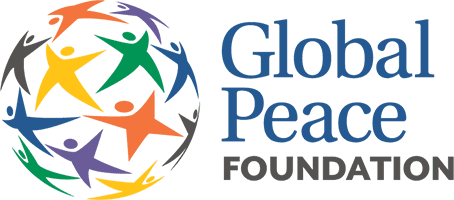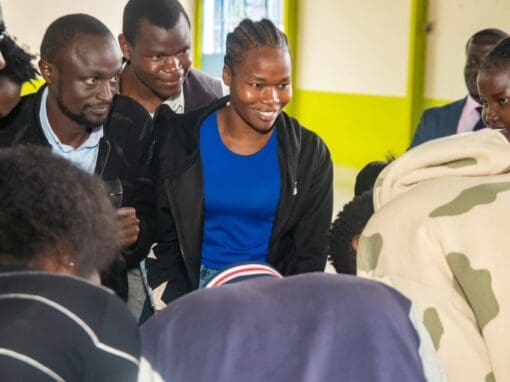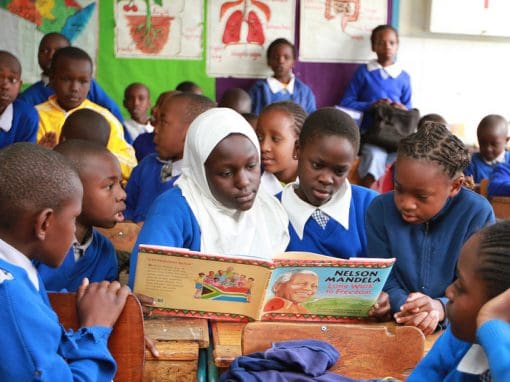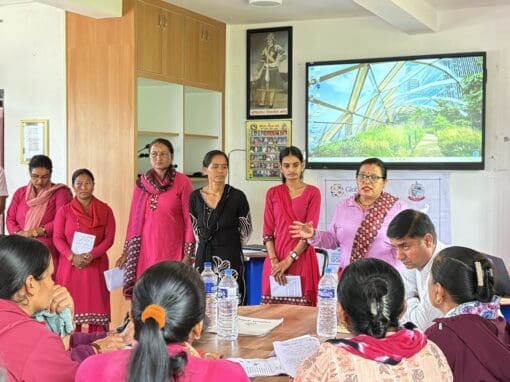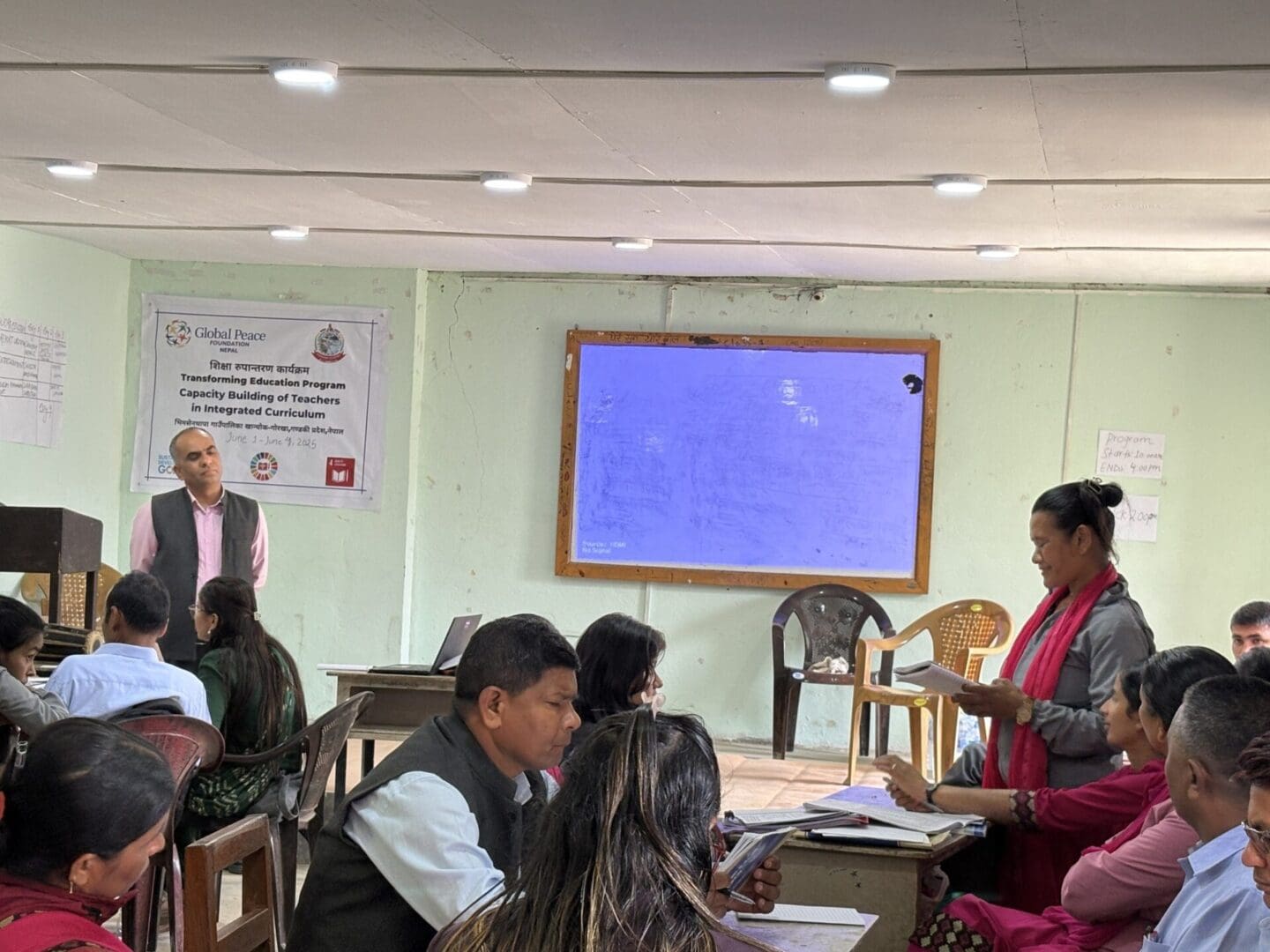
Expert trainer Krishna Dhungana (left) spoke on the principles and practices of the Integrated Curriculum to the teacher participants.
The Global Peace Foundation (GPF) Nepal, as part of its Transforming Education program, organized workshops in two cohorts: June 1-4 and August 11-14, 2025, on “Capacity Building of the Teachers through Integrated Curriculum” in Bhimsen Thapa Rural Municipality, Gorkha. The comprehensive training brought teachers together from 25 different schools within the rural municipality. There were altogether 68 teachers in the program: two teachers from each school. Dr. Babu Ram Dhungana and Krishna Dhungana were the experts who facilitated the four-day workshops. The major focus of the session includes guiding the teachers through essential aspects of Nepal’s Integrated Curriculum and equipping them with knowledge and practical skills for classroom implementation.
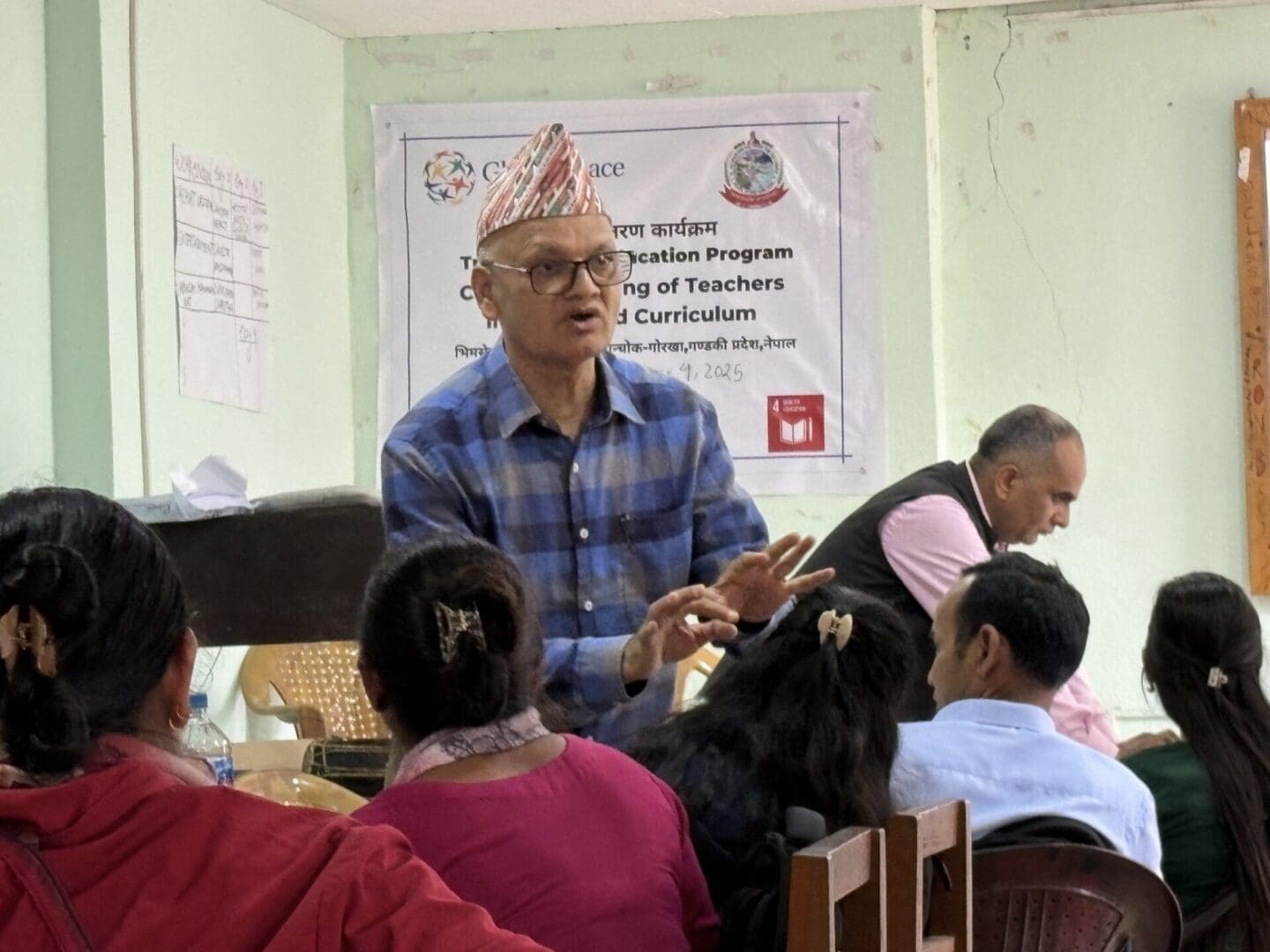
Expert trainer Dr. Baburam Dhungana explains to the teacher participants the gap between policy formation and implementation of the Integrated Curriculum, and guides them on how to navigate the associated challenges.
According to Prajapati (2024), the main objective of an integrated curriculum is to make learning more relevant and interesting by interrelating the learning of different subjects. This curriculum focuses on a continuous assessment system to evaluate the achievement of children and to progress them accordingly. It encourages students to make connections between different subjects, promoting a deeper understanding of concepts and enhancing their ability to apply knowledge in meaningful ways. It also emphasizes the integration of knowledge, skills, and concepts across disciplines, providing students with a holistic understanding of real-world issues and fostering critical thinking, problem-solving, and creativity. She explained that formative evaluation enables teachers to collect, analyze, and use students’ information to make teaching and learning processes more effective and productive through regular feedback mechanisms. This evaluation, however, has not been practiced by teachers in real classroom situations, albeit with rigorous policy provisions. And, although the integrated curriculum was introduced in 2076, teachers lack comprehensive knowledge and skills on the subject. This has resulted in difficulty in the proper implementation of the Integrated Curriculum.
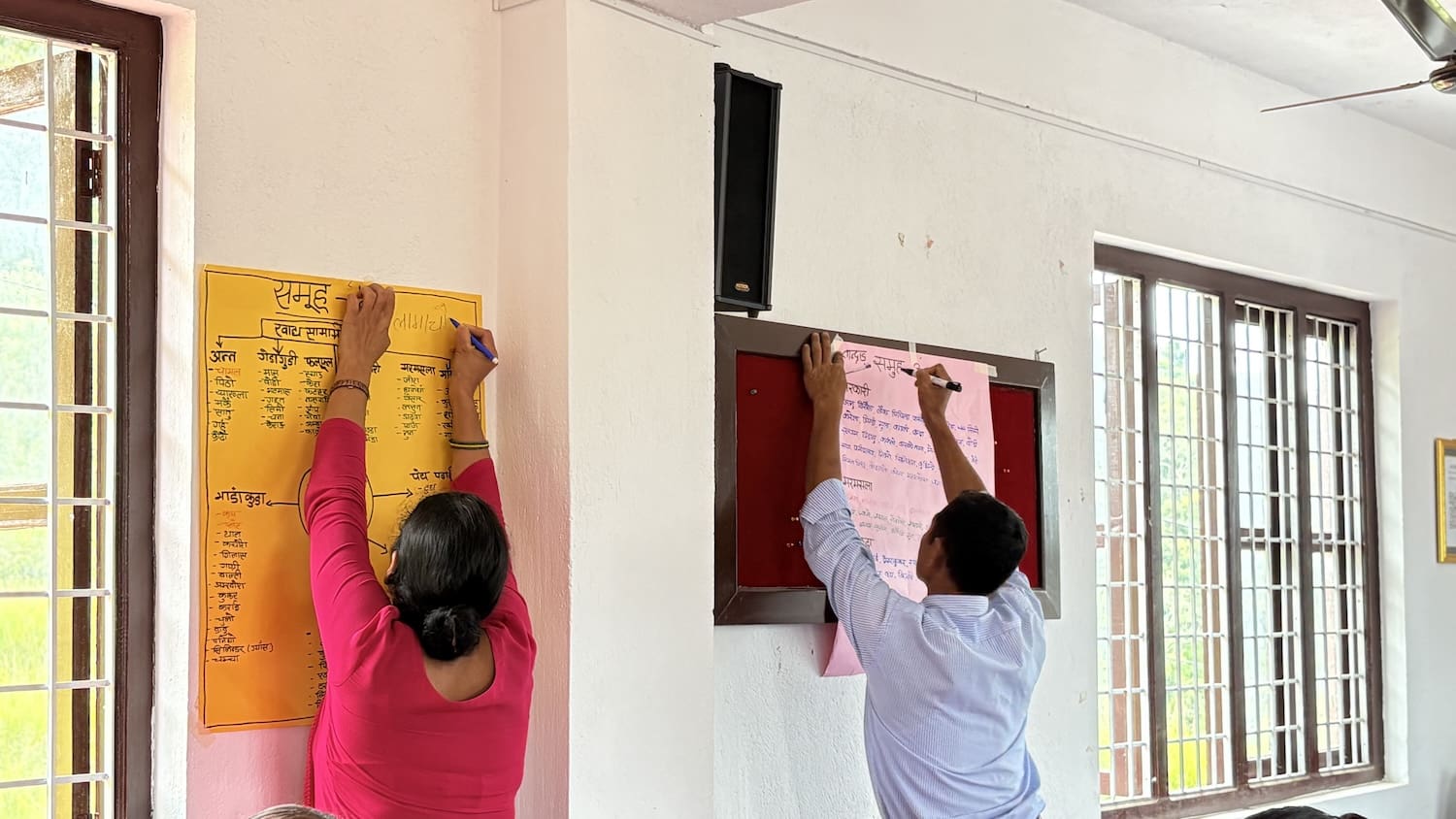
Teacher participants displaying chart papers after a group discussion on how a single theme can be used to integrate and teach multiple subjects.
Hence, GPF Nepal, understanding the gap in knowledge and practices of integrated curriculum among the teachers, organized workshops on capacity-building of Nepalese teachers in Integrated Curriculum so that it could support the government education policy in strengthening the education system of Nepal. In fact, while making plans and policies, there is no proper consultation, dialogue, or open communication among the field stakeholders.
Such a gap has weakened the educational institutions in Nepal. It can be argued that academic institutions will be fragile until and unless the field practitioners-teachers are included during plan and policy formation. Policy formation should not be bureaucratic.
GPF Nepal, with its values such as Living for the Greater Good, Dream Big, Teamwork, and Ownership, is tirelessly working to improve the quality of education in Nepal. It strongly believes in shaping the good behavior of schoolchildren as they are the future leaders who can bring positive transformation to the family, society, and the whole nation.
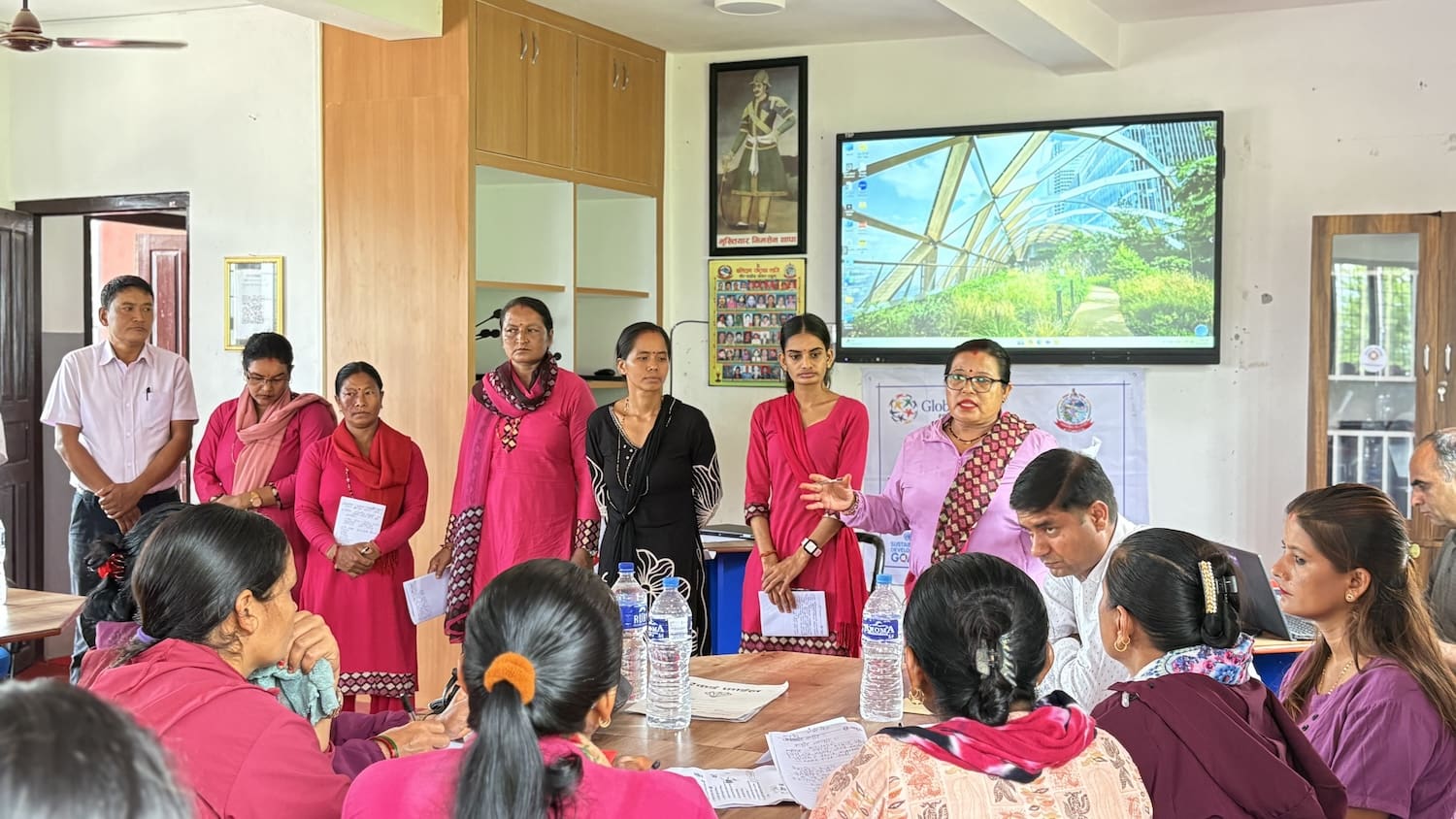
Teacher participants present the challenges they face while implementing the Integrated Curriculum in schools.
The workshop focused on strengthening teachers’ understanding of the National Curriculum Framework 2076: Integrated approach, cross-disciplinary learning, project-based methodologies, and incorporation of soft skills. Indeed, the teachers, over four days, intensively engaged in participatory activities such as group discussion, lesson demonstration, reflective session, and practical exercises. The training covered some important topics, for instance, conceptual understanding of the integrated curriculum, classroom management, student portfolio creation and management, and project-based learning (PBL). The session on assessment strategies using rubrics and implementation of PBL was quite educational and was significant as the methods linked with real-life context according to the teachers’ participants. However, many teachers acknowledged the challenges they face in pragmatically applying the integrated curriculum due to factors like limited resources, classroom sizes, and continuous support. Even so, they expressed confidence that the training had boosted their ability to navigate these issues.
One participant remarked, “We gained a lot of information about the integration including proper and effective use of the curriculum, process of conducting subject-integrated classes, group work, interactive teaching, and how to make learning easier. Furthermore, we enhanced our skills in evaluating learning achievements through various activities using rubrics.”
Another teacher added, “The main reasons for the weak learning outcomes in classrooms are the inability to implement the curriculum effectively and the lack of use of innovative teaching methods. Through collective work, participants learned how a group can divide a main theme into several sub-themes. In addition, based on the first lesson of Grade 2, discussions were held on how to construct questions according to Bloom’s levels of the cognitive domain—knowledge, understanding, application, analysis, evaluation, and synthesis—and I gained a deeper understanding of how such questions could enhance students’ practical knowledge and help achieve effective learning outcomes.”
The opening and closing ceremonies were graced by Bhimsen Thapa Rural Municipality’s Chairperson, Lok Prasad Banjara, Vice-Chairperson, Amrita Devi Wasti (Bhatta), Chief Administrative Officer, Chitra Bahadur Adhikari, and Social Coordinator, Narayan Shrestha, who emphasized the local government’s strong commitment to implement the integrated curriculum across schools—underscoring the local government’s strong commitment. They even applauded the initiative by Global Peace Foundation Nepal in strengthening education in the landscape of Nepal and emphasized the importance of teacher development in enhancing the quality of education. Additionally, they committed to supporting similar professional development programs in the future and ensuring that schools receive the necessary pedagogical resources to successfully implement the integrated curriculum.
The workshop addressed existing gaps in teachers’ knowledge and application of the integrated curriculum, which remains under-implemented despite policy provisions. Teachers appreciated the training and noted its relevance to real-life classroom challenges. Many requested a week-long workshop, mentioning that four days were not sufficient to grasp and internalize all components.
Learn more about our Transforming Education initiative.

